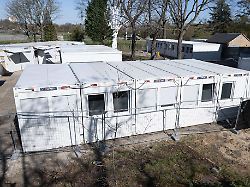The federal and state governments disagree
A dispute is brewing at the migration summit
05/07/2023 12:59 am
A few days before the migration summit, the fronts seem hardened. According to a report, the federal government is blocking this while the prime ministers are calling for more funding across all parties.
According to a media report, before the migration summit next Wednesday in Berlin, there is no agreement in sight between the federal, state and local governments in the dispute over financing issues. Contrary to the demands of many federal states, the government is apparently not planning any significant increase in refugee aid, the ARD reported, citing a draft paper.
Rather, the federal government refers to its billions in aid, which it provides despite a budget deficit – while the states and municipalities have surpluses. The accusation that the federal states would not pass on the full amount of the federal money to the cities and municipalities can also be found, at least indirectly, in the proposed resolution. In addition, the government wants to speed up asylum procedures and deportations, according to the ARD report.
In order to speed up asylum procedures, the federal government wants to get the federal states to better equip their immigration authorities with staff and technology and to completely digitize the procedures by the end of 2024. The declared goal is also to shorten asylum court procedures. EU accession aspirants such as Georgia or Moldova should be declared safe countries of origin. Asylum applications could then be rejected more easily.
In addition, the government is in favor of central arrival centers. From there, people whose asylum applications have little chance of success can be deported directly. The government also wants to make detention pending deportation possible regardless of asylum applications. Complaints against entry and residence bans should not have a suspensive effect on deportations.
Rhein demands doubling of federal spending
Meanwhile, the prime ministers of the federal states have increased the pressure on the federal government. “Cities, municipalities and districts need significantly more money – the federal government must therefore at least double its share of the current 2.75 billion euros,” demanded Hesse’s state boss Boris Rhein from the CDU in the editorial network Germany with a view to the costs. “There is no other way to finance accommodation and integration in the long term.”
Saxony-Anhalt’s Prime Minister Reiner Haseloff told “Bild am Sonntag”: “The federal government must finally ensure that immigration is controlled. If we in Germany are not able to act, trust in our democracy will be increasingly undermined.” Bavaria’s Prime Minister Markus Söder threatened to cut aid to countries of origin that did not take back rejected asylum seekers. “We stand by the fundamental right to asylum. But in the case of countries that do not agree to an orderly repatriation, we must also think about cuts in development aid in the future,” Söder told the newspaper.
Kretschmann: Don’t leave local authorities alone
Critical tones also came from the prime ministers of the traffic light parties. “The federal government must live up to its responsibility and must not leave the states and municipalities alone with the additional costs of the refugee crisis,” said Baden-Württemberg’s state chief Winfried Kretschmann from the Greens of the “Bild am Sonntag”. Anke Rehlinger, Saarland SPD Prime Minister, called for “the use of unclaimed housing promotion funds to create affordable housing that can also be used temporarily to accommodate refugees”.
Before the meeting, Federal Minister of the Interior Nancy Faeser sees good chances of finding a solution to migration policy within the EU. “I want us Europeans to finally act together – despite all resistance,” she told the newspaper. “We have already broken through the years of mutual blockade in the EU.” The main focus is on the proposal for asylum centers at the EU’s external borders, from where asylum seekers can also be sent back or distributed fairly. So far, however, Faeser has been skeptical about calls for the federal government to contribute more to the refugee costs of the federal states and municipalities.
